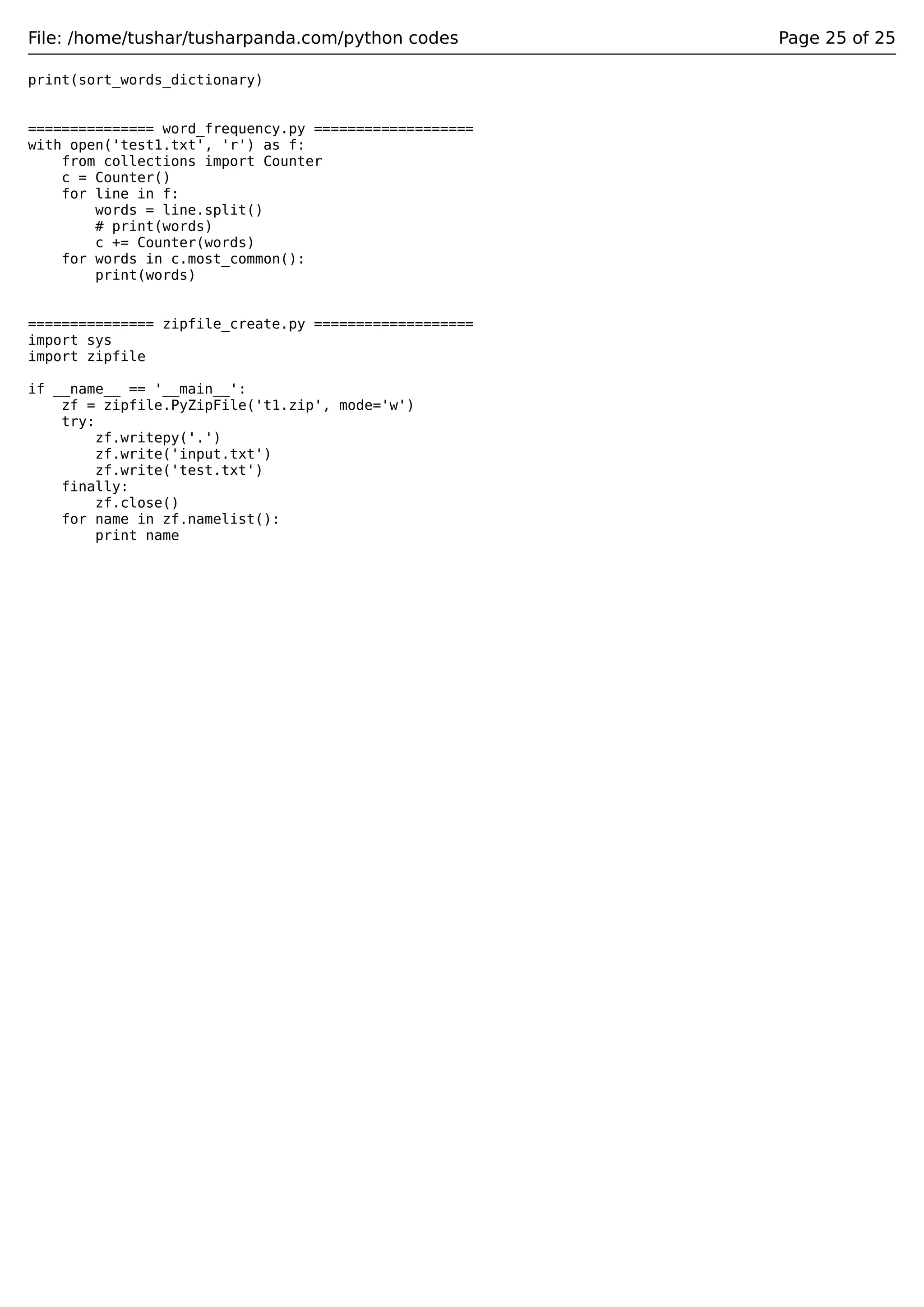The document contains Python scripts for various tasks, including command-line parameter handling, conditional statements, file operations, and encoding/decoding techniques. It also features functions for counting lines in code files, converting dictionaries to Excel, sending emails with attachments, and error handling. Overall, it is a compilation of practical Python programming examples covering a wide range of concepts.
![File: /home/tushar/tusharpanda.com/python codes Page 1 of 25 =============== cmdline_params.py =================== #!/usr/bin/python import sys, getopt def main(argv): inputfile = '' outputfile = '' try: opts, args = getopt.getopt(argv,"hi:o:",["ifile=","ofile="]) except getopt.GetoptError: print 'test.py -i <inputfile> -o <outputfile>' sys.exit(2) for opt, arg in opts: if opt == '-h': print 'test.py -i <inputfile> -o <outputfile>' sys.exit() elif opt in ("-i", "--ifile"): inputfile = arg elif opt in ("-o", "--ofile"): outputfile = arg print 'Input file is :', inputfile print 'Output file is :', outputfile if __name__ == "__main__": main(sys.argv[1:]) =============== conditional_if.py =================== #if statement #Write a function that includes each of the following: # An if statement with an elif clause and an else clause. # Write several if statements that use the logical operators: and, or, and not. Or, maybe a single if statement that uses them all. # Use the range() built-in function to create a list, for example: numbers = range(10). Write an if statement that tests a value to determine if it is in a list. # Write an if statement that tests whether the value is not in the list (above). # Create a small dictionary, for example: fruit = {'watermelon': 44}. Write an if statement that tests whether a key is in the dictionary and tests whether the value (associated with that key) is equal to some value (such as 44). # Assign a value to a variable, then write an if statement to determine whether that value is the same as None and another if statement to test whether the value is not None. # # if statement # def test_if(): list1 = ['apple', 'banana', 'cherry', 'date', ] for item in list1: if item == 'apple': print "it's an apple" elif item == 'banana': print "it's a banana" elif item == 'cherry': print "it's a cherry" else: print "it's an other --", item v1 = 3 v2 = 5 v3 = 7 if not (v1 < v2 and v2 < v3) or v1 != v2: print 'yes' else: print 'no' list2 = range(10) value1 = 5 value2 = 20 if value1 in list2: print "it's in -- %d" % value1 if value2 not in list2:](https://image.slidesharecdn.com/pythoncodes-160430085743/75/python-codes-1-2048.jpg)
![File: /home/tushar/tusharpanda.com/python codes Page 2 of 25 print "it's not -- %d" % value2 dict1 = {'watermelon': 4} key1 = 'watermelon' if key1 in dict1 and dict1[key1] == 4: print "it's good" key2 = 'cantaloupe' if key2 in dict1 and dict1[key2] == 4: print "it's bad" =============== conditional_while.py =================== #Qns: # Use a while statement to loop through a list of words and to find the first word with a specific number of characters. # Use a while statement to loop through a list; pop each item off the right end of the list and print the item, until the list is empty. # Write a function that uses a while statement and str.find(pat, pos) to print out all the positions of a pattern string in a target string. # Convert the above function into a function that returns a generator that produces all the positions of the pattern string in a target string. # # while statement # def test_while(word_length): words = ['a', 'bb', 'ccc', 'dddd', ] idx = 0 word = None while idx < len(words): if len(words[idx]) == word_length: word = words[idx] break idx += 1 print 'word: "%s"' % word print '-' * 20 word_length += 20 while idx < len(words): if len(words[idx]) == word_length: word = words[idx] break idx += 1 else: word = None print 'word: "%s"' % word print '-' * 20 items = range(10, 14) while items: item = items.pop() print 'popped item:', item return word def search_positions(pat, target): pos = 0 while True: pos = target.find(pat, pos) if pos < 0: break print 'search pos:', pos pos += 1 def generate_positions(pat, target): pos = 0 while True: pos = target.find(pat, pos) if pos < 0: break yield pos](https://image.slidesharecdn.com/pythoncodes-160430085743/75/python-codes-2-2048.jpg)
![File: /home/tushar/tusharpanda.com/python codes Page 3 of 25 pos += 1 def apply_at_positions(pat, target, func): pos = 0 while True: pos = target.find(pat, pos) if pos < 0: break func(pos, target[pos:pos + len(pat)]) pos += 1 def func1(pos, str_val): print 'apply at pos: %d "%s"' % (pos, str_val.upper(), ) =============== count_comment_code2.py =================== # coding=utf-8 import os import re def source_statistic(file_name): total = 0 blank = 0 comment = 0 with open(file_name) as f: lines = f.readlines() total += len(lines) pattern1 = re.compile(r'^s*$') pattern2 = re.compile(r'^s*#+') for line in lines: if pattern1.match(line): blank += 1 elif pattern2.match(line): comment += 1 return total, blank, comment def walk_dir(image_path): total = 0 blank = 0 comment = 0 for root, dirs, files in os.walk(image_path): for f in files: if f.lower().endswith('.py'): full_path = os.path.join(root, f) #resize_image(full_path) print full_path result = source_statistic(full_path) total += result[0] blank += result[1] comment += result[2] return total, blank, comment if __name__ == '__main__': result = walk_dir("source") print 'Total Lines: %d, Blank Lines: %d, Comment Lines: %d' % result =============== count_comment_code.py =================== import os](https://image.slidesharecdn.com/pythoncodes-160430085743/75/python-codes-3-2048.jpg)
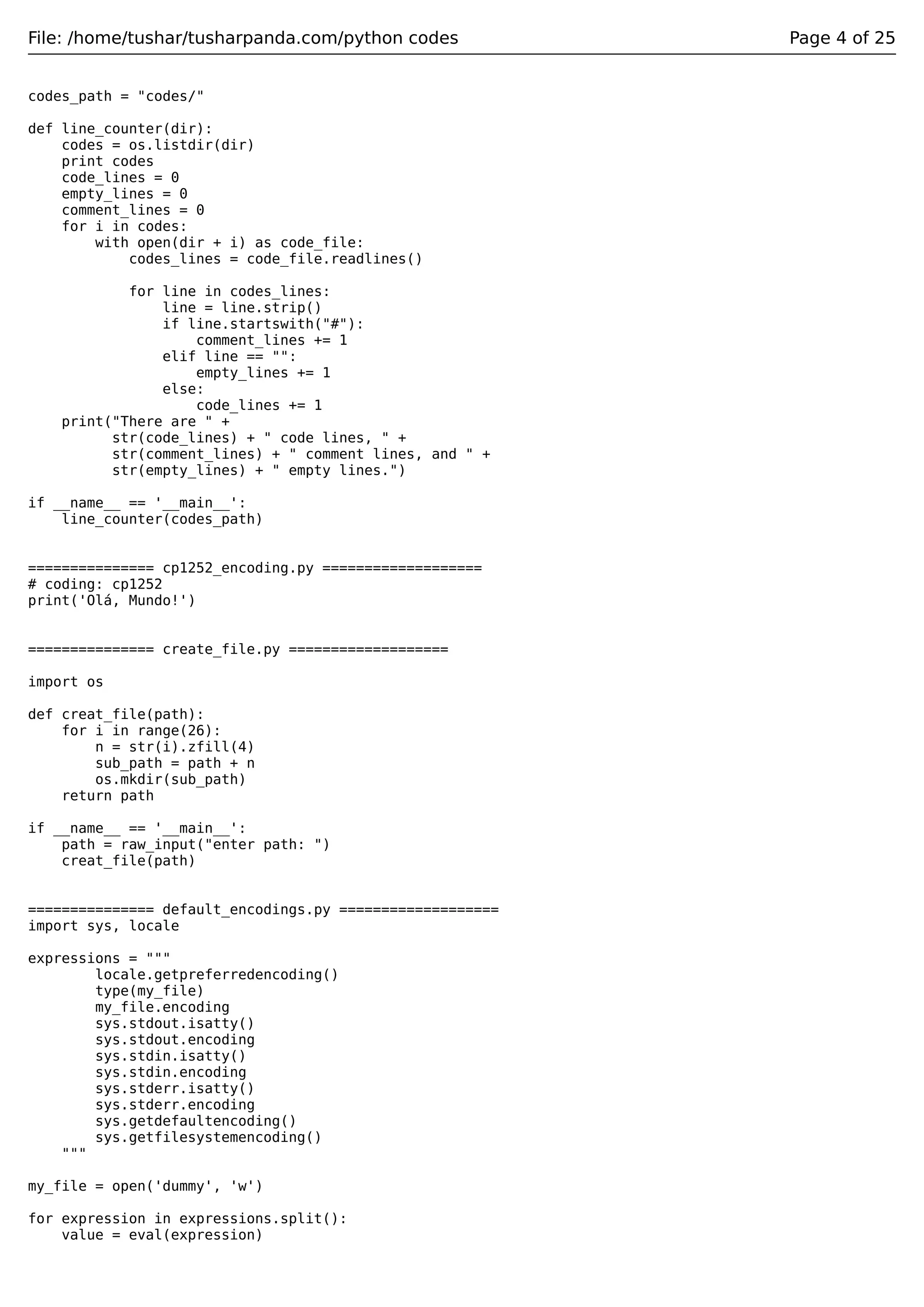
![File: /home/tushar/tusharpanda.com/python codes Page 5 of 25 print(expression.rjust(30), '->', repr(value)) =============== dict1.py =================== #!/usr/bin/env ''' the following code is a preliminary word processing, it won't split abbrevations, like "I'd", nor it won't split words concatenated with underscore, like "bad_game" ''' import os import re def word_count(file_path): word_dict = {} with open(file_path) as txt: for line in txt: words = re.findall(r"w+", line.strip()) for word in words: word = word.lower() word_dict[word] = word_dict.get(word,0) + 1 return word_dict result = word_count(os.path.join(os.path.dirname(os.path.abspath(__file__)), "sampletext.txt")) ################################################################################### ''' "How to "sort" a dict by its key/value" Obviously, a dict can not be sorted, since it is orderless in nature. However, what we can do is to sort a representation(a list of tuples or a list of keys) of dict. link: http://stackoverflow.com/questions/613183/sort-a-python-dictionary-by-value ''' import operator d = {"what": 3, "I": 19, "the":30} # to get a list of tuples with sorted items by the value sorted_d_by_value = sorted(d.items(), key=operator.itemgetter(1)) # to get a list of tuples with sorted key sorted_d_by_key = sorted(d.items(), key=operator.itemgetter(0)) print sorted_d_by_key =============== dict_to_xls_converter2.py =================== import json, xlwt with open('city.txt','r')as f: data = f.read().decode('gbk') data = json.loads(data) book = xlwt.Workbook(encoding='utf-8') sheet = book.add_sheet('city') for i in range(len(data)): sheet.write(i,0,i) sheet.write(i,1,data[str(i+1)]) book.save('city.xls') =============== dict_to_xls_converter.py =================== #coding:utf-8 import json import xlwt with open('student.txt','r')as f: data = f.read().decode('gbk') data = json.loads(data) book =xlwt.Workbook(encoding = 'utf-8')](https://image.slidesharecdn.com/pythoncodes-160430085743/75/python-codes-5-2048.jpg)
![File: /home/tushar/tusharpanda.com/python codes Page 6 of 25 sheet =book.add_sheet('student') for i in range(len(data)): d = data[str(i+1)] sheet.write(i,0,i+1) for j in range(len(d)): sheet.write(i,j+1,d[j]) book.save('student.xls') =============== email_gmail.py =================== # Code : Send attachment "capture.jpg" using gmail import smtplib from email.MIMEMultipart import MIMEMultipart from email.MIMEBase import MIMEBase from email.MIMEText import MIMEText from email import Encoders import os send_user = "YOUR_GMAIL_ID@gmail.com" #sender_email send_pwd = "YOUR_GMAIL_PASSWORD" #sender_password recv_user = "YOUR_GMAIL_ID@gmail.com" #receiver_email subject = "Test Email !!!!" def mail(to, subject, text, attach): msg = MIMEMultipart() msg['From'] = send_user msg['To'] = recv_user msg['Subject'] = subject msg.attach(MIMEText(text)) part = MIMEBase('application', 'octet-stream') part.set_payload(open(attach, 'rb').read()) Encoders.encode_base64(part) part.add_header('Content-Disposition','attachment; filename="%s"' % os.path.basename(attach)) msg.attach(part) mailServer = smtplib.SMTP("smtp.gmail.com", 587) mailServer.ehlo() mailServer.starttls() mailServer.ehlo() mailServer.login(send_user, send_pwd) mailServer.sendmail(send_user, to, msg.as_string()) mailServer.close() mail(recv_user, subject,"imaeg snapshot !!!","capture.jpg") =============== encode_decode4.py =================== #http://stackoverflow.com/questions/1207457/convert-a-unicode-string-to-a-string-in-python-containing- extra-symbols ## import binascii text1 = "tushar" text2 = binascii.hexlify(text1) text3 = binascii.unhexlify(text2) print "original",text1 print "string to hex",text2 print "hex to string",text3 #web input unicode to ascii raw_data.encode('ascii','ignore') unicodedata.normalize('NFKD', raw_data).encode('ascii','ignore') ## unicodestring = u"Hello world"](https://image.slidesharecdn.com/pythoncodes-160430085743/75/python-codes-6-2048.jpg)
![File: /home/tushar/tusharpanda.com/python codes Page 7 of 25 # Convert Unicode to plain Python string: "encode" utf8string = unicodestring.encode("utf-8") asciistring = unicodestring.encode("ascii") isostring = unicodestring.encode("ISO-8859-1") utf16string = unicodestring.encode("utf-16") # Convert plain Python string to Unicode: "decode" plainstring1 = unicode(utf8string, "utf-8") plainstring2 = unicode(asciistring, "ascii") plainstring3 = unicode(isostring, "ISO-8859-1") plainstring4 = unicode(utf16string, "utf-16") assert plainstring1 == plainstring2 == plainstring3 == plainstring4 =============== encode_decode_file.py =================== #base64 encoding/decoding file import base64 file1 = open("file1","w") file1.write("how r u") file1.close() base64.encode(open("file1"),open("file1.64","w")) base64.decode(open("file1.64"),open("file2","w")) =============== encode_decode_image.py =================== #base64 encoding/decoding image/picture/photo import base64 imageFile = open("failure.png", "rb") str = base64.b64encode(imageFile.read()) fh = open("file1", "w") fh.write(str) fh.close() fh = open("file1", "r") str3 = fh.read() fh.close() fh = open("image2.jpg", "wb") fh.write(str3.decode('base64')) fh.close() =============== encode_decode_simple.py =================== ##unicode/encode/decode import binascii convert text nbyte string. def to_hex(t, nbytes): chars_per_item = nbytes * 2 hex_version = binascii.hexlify(t) return ' '.join( hex_version[start:start + chars_per_item] for start in xrange(0, len(hex_version), chars_per_item) ) if __name__ == '__main__': print to_hex('abcdef', 1) print to_hex('abcdef', 3) =============== encode_decode_text.py =================== #base64 encoding/decoding text import base64 string_orig = "tushar" string_enc = base64.encodestring(string_orig) string_dec = base64.decodestring(string_enc) print string_orig print string_enc](https://image.slidesharecdn.com/pythoncodes-160430085743/75/python-codes-7-2048.jpg)
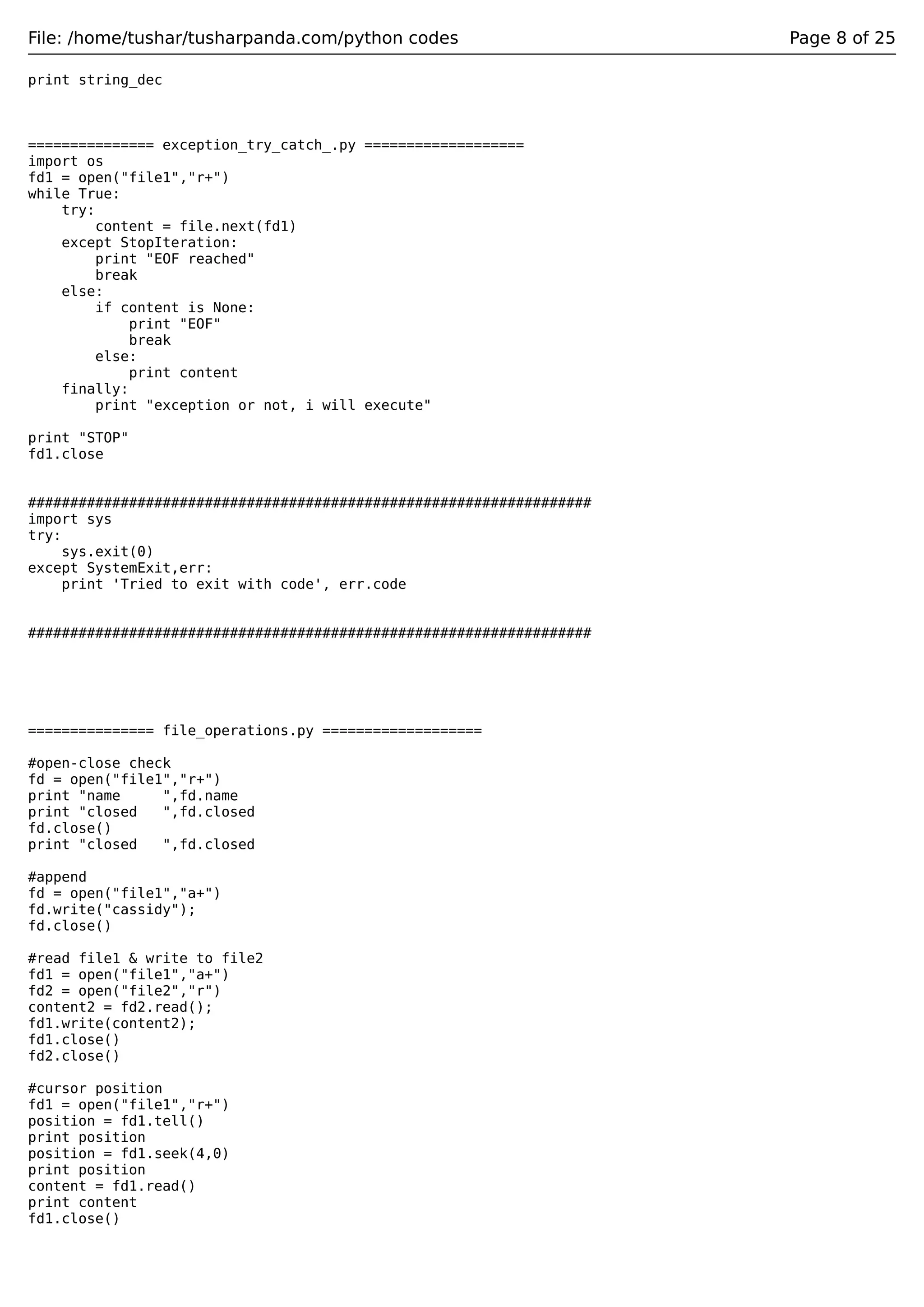
![File: /home/tushar/tusharpanda.com/python codes Page 9 of 25 #read file line by line with open("symbols",'rb') as f: while True: line=f.readline() ##f.readline(5) read 5 lines if not line: break process(line) ######file operations---------------------------------- import os os.rmdir("dir1") os.mkdir("dir1") fd1 = open("file1","r+") while True: try: content = file.next(fd1) except StopIteration: print "EOF reached" break else: if content is None: print "EOF" break else: print content finally: print "exception or not, i will execute" print "STOP" fd1.close #------------------------------------------------------ ############################################################################## with open('file1') as f: lines = f.readlines() line = lines.rstrip('n') print line #lines = [line.rstrip('') for line in open('file1')] #lines = [line.strip('t').strip('n') for line in lines] =============== filtered_words2.py =================== #coding:utf-8 with open('filtered_words.txt','r')as f: data = f.read().decode('gbk') filt = data.split('n') while True: text = raw_input("please input:") text = text.decode('gbk') for x in filt: if text.find(x) != -1: text = text.replace(x,'*'*len(x)) print text =============== filtered_words.py =================== #coding:utf-8 with open('filtered_words.txt','r')as f: data = f.read()](https://image.slidesharecdn.com/pythoncodes-160430085743/75/python-codes-9-2048.jpg)
![File: /home/tushar/tusharpanda.com/python codes Page 10 of 25 filt = data.split('n') while True: flag = False text = raw_input("please input:") for x in filt: if text.find(x) != -1: flag = True if flag: print "Match Found" else: print "Match Failed" =============== find_keywords_in_diary.py =================== import os import re # set diaries path diaries_path = "diaries/" diaries = os.listdir(diaries_path) # set stop words to make informative keywords stop_words = open("StopWords.txt", 'r').read() stop_words_list = stop_words.split(" ") # Find top 5 keywords in a txt def find_keywords(words): words_dictionary = {} for word in words: if word.lower() not in words_dictionary and word.lower() not in stop_words_list: # Put word in dictionary words_dictionary[word] = 0 for item in words: if item == word: words_dictionary[word] += 1 # Find 5 keywords which by highest frequency keywords = sorted( words_dictionary, key=words_dictionary.__getitem__, reverse=True)[0:5] return keywords for diary in diaries: # Coding by utf-8 with open(diaries_path + diary, "r") as content: diary_words_list = re.findall(r"[w']+", content.read()) print("The keywords of diary " + diary + " is: ") print(find_keywords(diary_words_list)) =============== formatted_print.py =================== metro_areas = [ ('Tokyo', 'JP', 36.933, (35.689722, 139.691667)), ('Delhi NCR', 'IN', 21.935, (28.613889, 77.208889)), ('Mexico City', 'MX', 20.142, (19.433333, -99.133333)), ('New York-Newark', 'US', 20.104, (40.808611, -74.020386)), ('Sao Paulo', 'BR', 19.649, (-23.547778, -46.635833)), ] print('{:15} | {:^9} | {:^9}'.format('', 'lat.', 'long.')) fmt = '{:15} | {:9.4f} | {:9.4f}' for name, cc, pop, (latitude, longitude) in metro_areas: # <2> if longitude <= 0: # <3> print(fmt.format(name, latitude, longitude)) =============== html_extract_links.py =================== from HTMLParser import HTMLParser import urllib2 class MyHTMLParser(HTMLParser): def __init__(self):](https://image.slidesharecdn.com/pythoncodes-160430085743/75/python-codes-10-2048.jpg)
![File: /home/tushar/tusharpanda.com/python codes Page 11 of 25 HTMLParser.__init__(self) self.links = [] def handle_starttag(self, tag, attrs): if tag == "a": if len(attrs) == 0: pass else: for (variable, value) in attrs: if variable == "href": self.links.append(value) if __name__ == "__main__": html_code = """<a href="www.google.com">google.com</a><a HREF ="www.sina.com.cn">Sina</a>""" url = 'http://www.google.com' html = urllib2.urlopen(url) html_code = html.read() hp = MyHTMLParser() hp.feed(html_code) hp.close() for link in hp.links: if link.find("http")==0: print link =============== html_extract_text.py =================== from HTMLParser import HTMLParser from re import sub from sys import stderr from traceback import print_exc import urllib2 class _DeHTMLParser(HTMLParser): def __init__(self): HTMLParser.__init__(self) self.__text = [] def handle_data(self, data): text = data.strip() if len(text) > 0: text = sub('[ trn]+', ' ', text) self.__text.append(text + ' ') def handle_starttag(self, tag, attrs): if tag == 'p': self.__text.append('nn') elif tag == 'br': self.__text.append('n') def handle_startendtag(self, tag, attrs): if tag == 'br': self.__text.append('nn') def text(self): return ''.join(self.__text).strip() def dehtml(text): try: parser = _DeHTMLParser() parser.feed(text) parser.close() return parser.text() except: print_exc(file=stderr) return text if __name__ == '__main__': url = "http://SOMEURL"](https://image.slidesharecdn.com/pythoncodes-160430085743/75/python-codes-11-2048.jpg)
![File: /home/tushar/tusharpanda.com/python codes Page 12 of 25 html = urllib2.urlopen(url) html_code = html.read() html_code = sub('<script>(.*?)</script>','',html_code) print dehtml(html_code).decode('gbk').encode('utf-8') with open('result.txt','w') as f: f.write(dehtml(html_code).decode('gbk').encode('utf-8')) =============== important_word.py =================== # -*- coding: utf-8 -*- import re import os # Get all files in designated path def get_files(path): filepath = os.listdir(path) files = [] for fp in filepath: fppath = path + '/' + fp if(os.path.isfile(fppath)): files.append(fppath) elif(os.path.isdir(fppath)): files += get_files(fppath) return files # Get the most popular word in designated files def get_important_word(files): worddict = {} for filename in files: f = open(filename, 'rb') s = f.read() words = re.findall(r'[a-zA-Z0-9]+', s) for word in words: worddict[word] = worddict[word] + 1 if word in worddict else 1 f.close() wordsort = sorted(worddict.items(), key=lambda e:e[1], reverse=True) return wordsort if __name__ == '__main__': files = get_files('.') print files wordsort = get_important_word(files) maxnum = 1 for i in range(len(wordsort) - 1): if wordsort[i][1] == wordsort[i + 1][1]: maxnum += 1 else: break for i in range(maxnum): print wordsort[i] =============== inheritance.py =================== class A: def ping(self): print('ping:', self) class B(A): def pong(self): print('pong:', self) class C(A): def pong(self): print('PONG:', self) class D(B, C): def ping(self):](https://image.slidesharecdn.com/pythoncodes-160430085743/75/python-codes-12-2048.jpg)
![File: /home/tushar/tusharpanda.com/python codes Page 13 of 25 super().ping() print('post-ping:', self) def pingpong(self): self.ping() super().ping() self.pong() super().pong() C.pong(self) =============== keyword_extractor1.py =================== # coding=UTF-8 import nltk from nltk.corpus import brown import os # This is a fast and simple noun phrase extractor (based on NLTK) # Feel free to use it, just keep a link back to this post # http://thetokenizer.com/2013/05/09/efficient-way-to-extract-the-main-topics-of-a-sentence/ # http://www.sharejs.com/codes/ # Create by Shlomi Babluki # May, 2013 # This is our fast Part of Speech tagger ############################################################################# brown_train = brown.tagged_sents(categories='news') regexp_tagger = nltk.RegexpTagger( [(r'^-?[0-9]+(.[0-9]+)?$', 'CD'), (r'(-|:|;)$', ':'), (r''*$', 'MD'), (r'(The|the|A|a|An|an)$', 'AT'), (r'.*able$', 'JJ'), (r'^[A-Z].*$', 'NNP'), (r'.*ness$', 'NN'), (r'.*ly$', 'RB'), (r'.*s$', 'NNS'), (r'.*ing$', 'VBG'), (r'.*ed$', 'VBD'), (r'.*', 'NN') ]) unigram_tagger = nltk.UnigramTagger(brown_train, backoff=regexp_tagger) bigram_tagger = nltk.BigramTagger(brown_train, backoff=unigram_tagger) ############################################################################# # This is our semi-CFG; Extend it according to your own needs ############################################################################# cfg = {} cfg["NNP+NNP"] = "NNP" cfg["NN+NN"] = "NNI" cfg["NNI+NN"] = "NNI" cfg["JJ+JJ"] = "JJ" cfg["JJ+NN"] = "NNI" ############################################################################# class NPExtractor(object): def __init__(self, sentence): self.sentence = sentence # Split the sentence into singlw words/tokens def tokenize_sentence(self, sentence): tokens = nltk.word_tokenize(sentence) return tokens # Normalize brown corpus' tags ("NN", "NN-PL", "NNS" > "NN") def normalize_tags(self, tagged): n_tagged = [] for t in tagged:](https://image.slidesharecdn.com/pythoncodes-160430085743/75/python-codes-13-2048.jpg)
![File: /home/tushar/tusharpanda.com/python codes Page 14 of 25 if t[1] == "NP-TL" or t[1] == "NP": n_tagged.append((t[0], "NNP")) continue if t[1].endswith("-TL"): n_tagged.append((t[0], t[1][:-3])) continue if t[1].endswith("S"): n_tagged.append((t[0], t[1][:-1])) continue n_tagged.append((t[0], t[1])) return n_tagged # Extract the main topics from the sentence def extract(self): tokens = self.tokenize_sentence(self.sentence) tags = self.normalize_tags(bigram_tagger.tag(tokens)) merge = True while merge: merge = False for x in range(0, len(tags) - 1): t1 = tags[x] t2 = tags[x + 1] key = "%s+%s" % (t1[1], t2[1]) value = cfg.get(key, '') if value: merge = True tags.pop(x) tags.pop(x) match = "%s %s" % (t1[0], t2[0]) pos = value tags.insert(x, (match, pos)) break matches = [] for t in tags: if t[1] == "NNP" or t[1] == "NNI": # if t[1] == "NNP" or t[1] == "NNI" or t[1] == "NN": matches.append(t[0]) return matches # Main method, just run "python np_extractor.py" def main(): path = '.' for file in os.listdir(path): text = [] if file.endswith('.text'): with open(file, 'rt') as f: for line in f: words = line.split() text += words str_text=' '.join(text) np_extractor = NPExtractor(str_text) result = np_extractor.extract() print("This file is about: %s" % ", ".join(result)) if __name__ == '__main__': main() =============== keyword_extractor.py =================== import os,re from collections import Counter import nltk from nltk.corpus import stopwords useless_words=['the','I','and',''] def main(): for file in os.listdir("."): result=Counter() if file.endswith('.text'):](https://image.slidesharecdn.com/pythoncodes-160430085743/75/python-codes-14-2048.jpg)
![File: /home/tushar/tusharpanda.com/python codes Page 15 of 25 with open(file,'rt') as f: for line in f: # delete the stopwords in note words=line.split() words= [w for w in words if not w in stopwords.words('english')] result+=Counter(words) print('The most important word in %s is %s',(file,result.most_common(2))) if __name__ == '__main__': main() =============== link_retrieval_bs.py =================== import requests as req from bs4 import BeautifulSoup url = "http://www.theplantlist.org/browse/-/" response = req.get(url=url) soup = BeautifulSoup(response.content,"lxml") urls = [a_tag.get('href') for a_tag in soup.find_all('a') if a_tag.get('href').startswith('http')] print(urls) =============== list_files_directory.py =================== import os # Get all files in designated path def get_files(path): filepath = os.listdir(path) files = [] for fp in filepath: fppath = path + '/' + fp if(os.path.isfile(fppath)): files.append(fppath) elif(os.path.isdir(fppath)): files += get_files(fppath) return files list1 = get_files(".") for i in list1: print i =============== list_pdf_files.py =================== import os import glob def main(): list_pdf = glob.glob("*.pdf") print "pdf files in directory:",list_pdf main() =============== mysql1.py =================== #insert data import MySQLdb as mdb con = mdb.connect('localhost', 'testuser', 'test623', 'testdb'); with con: cur = con.cursor() cur.execute("DROP TABLE IF EXISTS Writers") cur.execute("CREATE TABLE Writers(Id INT PRIMARY KEY AUTO_INCREMENT, Name VARCHAR(25))") cur.execute("INSERT INTO Writers(Name) VALUES('abc')") cur.execute("INSERT INTO Writers(Name) VALUES('def')")](https://image.slidesharecdn.com/pythoncodes-160430085743/75/python-codes-15-2048.jpg)
![File: /home/tushar/tusharpanda.com/python codes Page 16 of 25 cur.execute("INSERT INTO Writers(Name) VALUES('feh')") cur.execute("INSERT INTO Writers(Name) VALUES('fet')") cur.execute("INSERT INTO Writers(Name) VALUES('geh')") =============== mysql2.py =================== # retrieve data (all at once) import MySQLdb as mdb con = mdb.connect('localhost', 'testuser', 'test623', 'testdb'); with con: cur = con.cursor() cur.execute("SELECT * FROM Writers") rows = cur.fetchall() for row in rows: print row =============== mysql3.py =================== # retrieve data (one-by-one) import MySQLdb as mdb con = mdb.connect('localhost', 'testuser', 'test623', 'testdb'); with con: cur = con.cursor() cur.execute("SELECT * FROM Writers") for i in range(cur.rowcount): row = cur.fetchone() print row[0], row[1] #close database con.close() =============== object_reference1.py =================== class bus1: """remove passengers """ def __init__(self, passengers=None): if passengers is None: self.passengers = [] # <1> else: self.passengers = passengers #<2> def pick(self, name): self.passengers.append(name) def drop(self, name): self.passengers.remove(name) # <3> passengers = ['ajit', 'nikhil', 'sam', 'srini', 'jagdish'] print "actual: ",passengers bus = bus1(passengers) bus.drop('nikhil') bus.drop('srini') print "remaining: ",passengers =============== pass_by_value_reference.py =================== #!/usr/bin/python #pass by value----------------------------------------](https://image.slidesharecdn.com/pythoncodes-160430085743/75/python-codes-16-2048.jpg)
![File: /home/tushar/tusharpanda.com/python codes Page 17 of 25 # Function definition is here def printme( str ): "This prints a passed string into this function" print str; return; # Now you can call printme function printme("I'm first call to user defined function!"); printme("Again second call to the same function"); #pass by reference---------------------------------------- # Function definition is here def changeme( mylist ): "This changes a passed list into this function" mylist.append([1,2,3,4]); print "Values inside the function: ", mylist return # Now you can call changeme function mylist = [10,20,30]; changeme( mylist ); print "Values outside the function: ", mylist =============== password1.py =================== import os from hashlib import sha256 from hmac import HMAC def encrypt_password(password, salt=None): if salt is None: salt = os.urandom(8) assert 8 == len(salt) assert isinstance(salt, str) if isinstance(password, unicode): password = password.encode('utf-8') assert isinstance(password, str) for i in range(10): encrypted = HMAC(password, salt, sha256).digest() return salt + encrypted def validate_password(hashed, password): return hashed == encrypt_password(password, hashed[:8]) if __name__ == "__main__": password_new = raw_input("Set your passwordn") password_saved = encrypt_password(password_new) password_again = raw_input("Now,type in your passwordn") print "Password match." if validate_password(password_saved, password_again) else "wrong password." =============== pdf_page_count_using_re.py =================== import re import os rxcountpages = re.compile(r"/Types*/Page([^s]|$)", re.MULTILINE|re.DOTALL) def count_pages(filename): data = file(filename,"rb").read() print data return len(rxcountpages.findall(data)) if __name__=="__main__": filename = 'input.pdf'](https://image.slidesharecdn.com/pythoncodes-160430085743/75/python-codes-17-2048.jpg)
![File: /home/tushar/tusharpanda.com/python codes Page 18 of 25 print count_pages(filename) =============== random_code_generator1.py =================== import random import string coupon_number = 20 coupon_size = 15 for i in range(coupon_number): coupon = ''.join( random.sample(string.digits + string.ascii_uppercase, coupon_size)) print(coupon) =============== random_code_generator.py =================== # -*- coding: utf-8 -*- from random import Random def codeGenerator(number, codeLength = 8): print '**** Code Generator ****' codeFile = open('codes.txt', 'w') if number <= 0: return 'invalid number of codes' else: chars = 'abcdefghijklmnopgrstuvwxyzABCDEFGHIJKLMNOPGRSTUVWXYZ1234567890' random = Random() for j in range(1, number+1): str = '' for i in range(1, codeLength+1): index = random.randint(1, len(chars)) str = str + chars[index-1] codeFile.write(str+'n') print codeGenerator(20) =============== retrieve_links_from_html.py =================== #coding:utf-8 import re with open('Gaana.com.html','rb')as f: data = f.read() data = data.replace('r','').replace('b','').replace('n','') find = re.compile(r'href="(.*?)"') result = find.findall(data) for x in result: if x.find("http") > -1: print x =============== retrieve_links_webpage2.py =================== #!/usr/bin/env python3 import re import requests r = requests.get('https://github.com') print type(r) matches = re.findall('(?:https?|ftp)://[^s/$.?#].[^s]+', r.text) for i in range(0, len(matches)): print('matche >>>: {} n'.format(matches[i])) =============== retrieve_link_webpage_http_string_match.py =================== import requests import re from bs4 import BeautifulSoup](https://image.slidesharecdn.com/pythoncodes-160430085743/75/python-codes-18-2048.jpg)
![File: /home/tushar/tusharpanda.com/python codes Page 19 of 25 url = "http://stackoverflow.com" html = requests.get(url) soup = BeautifulSoup(html.text,"html.parser") find_href = soup.findAll('a') for x in find_href: print(x['href']) =============== selenium_save_complete_page.py =================== from selenium import webdriver from selenium.webdriver.common.keys import Keys from selenium.webdriver.common.desired_capabilities import DesiredCapabilities import time from lxml import html import os import urllib2 from bs4 import BeautifulSoup as bsp from selenium.webdriver.support.ui import WebDriverWait import timeit from selenium.webdriver.support import expected_conditions as EC from selenium.webdriver.common.action_chains import ActionChains from selenium.webdriver.common.keys import Keys driver = webdriver.Firefox() driver.get("https://google.in") time.sleep(2) ActionChains(driver) .key_down(Keys.CONTROL) .key_down('s') .key_up(Keys.CONTROL) .key_up('s') .perform() #element = driver.find_element_by_id('lst-ib') #ActionChains(driver) # .key_down(Keys.CONTROL) # .click(element) # .key_up(Keys.CONTROL) raw_input("ctrl+s triggered...") #htmltext = (driver.page_source).encode('utf-8') #f = open("google1", "w") #print >> f, htmltext #f.close() time.sleep(5) driver.close() print "Exiting.." =============== shallow_deep_copy.py =================== import copy class Bus: def __init__(self, passengers=None): if passengers is None: self.passengers = [] else: self.passengers = list(passengers) def pick(self, name): self.passengers.append(name) def drop(self, name): self.passengers.remove(name) bus1 = Bus(['Alice', 'Bill', 'Claire', 'David'])](https://image.slidesharecdn.com/pythoncodes-160430085743/75/python-codes-19-2048.jpg)
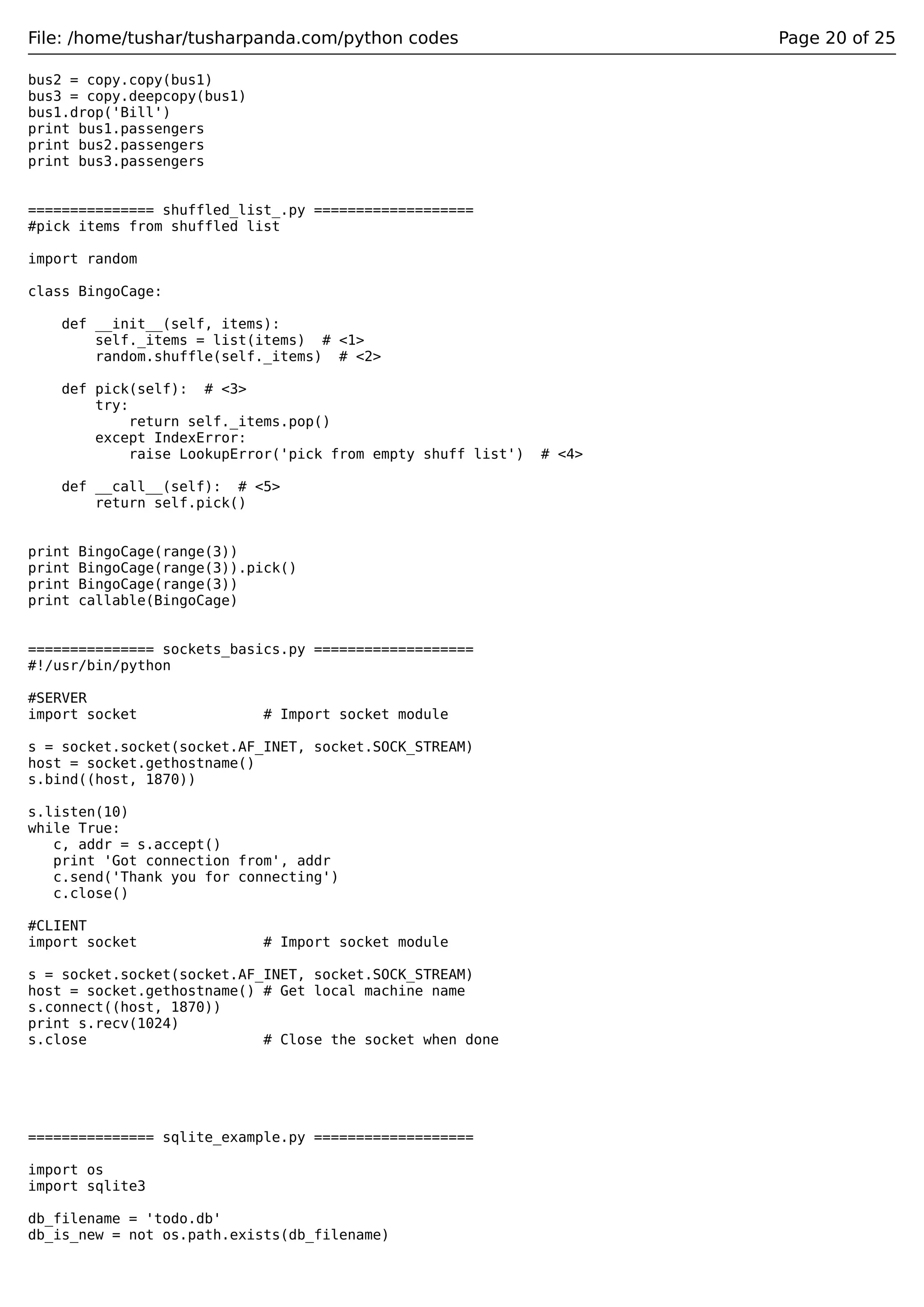
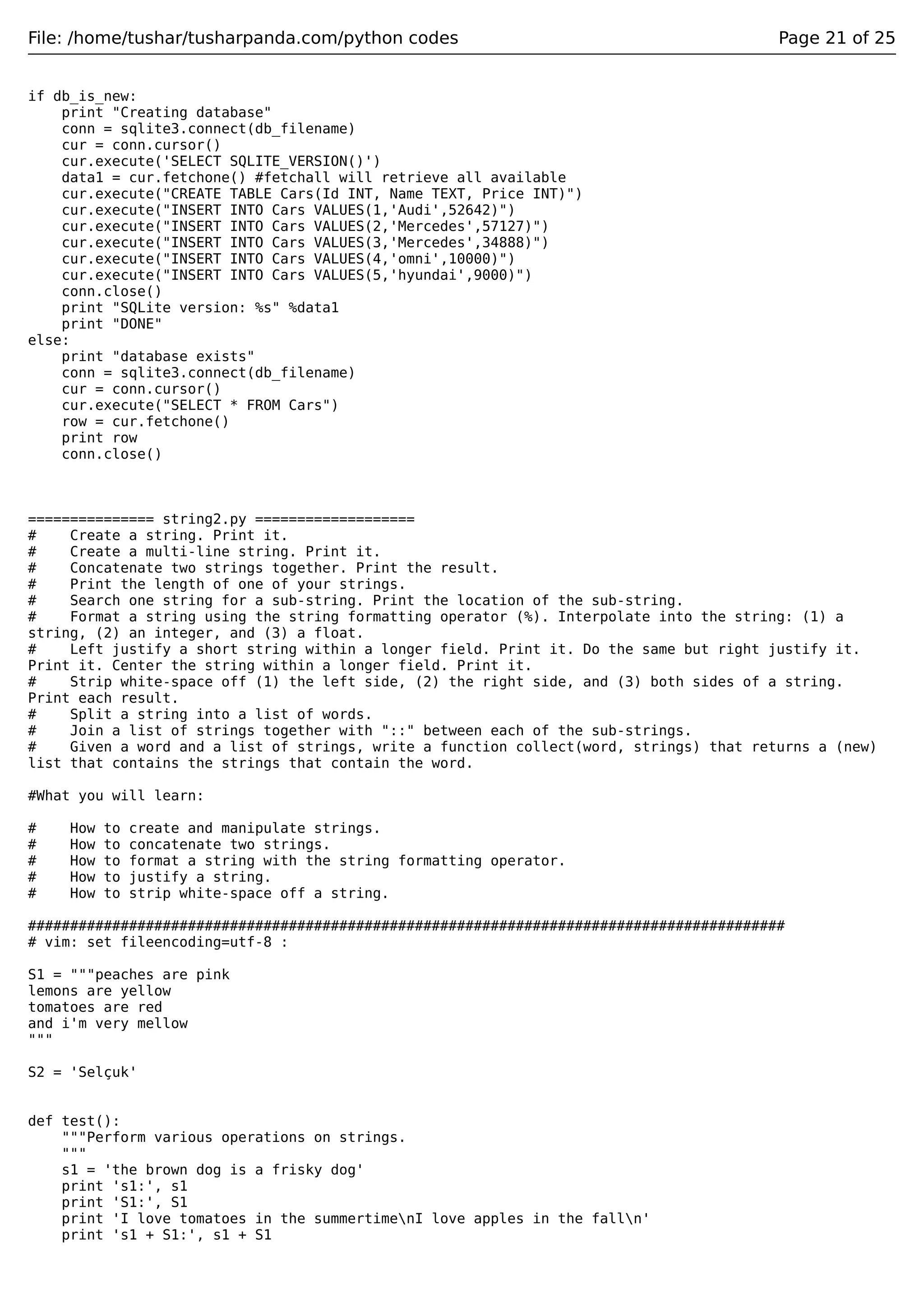
![File: /home/tushar/tusharpanda.com/python codes Page 22 of 25 print 'len(s1):', len(s1) n1 = s1.find('dog') n2 = s1.find('dog', n1 + 1) print 'n1, n2:', n1, n2 name = 'dave' category = 3 intensity = 4.8 s2 = '"%s" is in category %d with intensity %.3f' % ( name, category, intensity, ) print 's2:', s2 print 'ljust: "%s"' % name.ljust(10) print 'rjust: "%s"' % name.rjust(10) s3 = ' abc def n' print 'lstrip: "%s"' % s3.lstrip() print 'rstrip: "%s"' % s3.rstrip() print 'strip: "%s"' % s3.strip() data = ['abc', 'def', 'ghi', 'jkl', ] print 'join:', '::'.join(data) # notice the encoding definition at the top of this file. # can also use: # # coding=utf-8 print 'len s4:', len(S2) s5 = S2.decode('utf-8') print 'len s5:', len(s5) s6 = s5.encode('utf-8') print 's6:', s6 s7 = u'Selxe7uk' s8 = s7.encode('utf-8') print 's8:', s8 def collect(word, strings): acc = [] for string in strings: if string.find(word) > -1: acc.append(string) return acc def main(): test() accum = collect('dog', ['each dog has his day', 'the cat is furry']) print 'accum from collect:', accum if __name__ == '__main__': main() =============== string_search.py.py =================== """ Synopsis: Search a target string for a pattern. Print all the positions of the occurance of the pattern string within the target string. Implement the above in two different ways: 1. Use a while: statement. 2. Implement a generator function (a function that uses the yield statement). Usage: python search_str.py """ import sys def search_while(pat, target): pos = 0 while True:](https://image.slidesharecdn.com/pythoncodes-160430085743/75/python-codes-22-2048.jpg)
![File: /home/tushar/tusharpanda.com/python codes Page 23 of 25 pos = target.find(pat, pos) if pos < 0: break print pos pos += 1 def generate_positions(pat, target): pos = 0 while True: pos = target.find(pat, pos) if pos < 0: break yield pos pos += 1 def test(): args = sys.argv[1:] if len(args) != 0: sys.exit(__doc__) search_while('xxx', 'aaaxxxbbbxxxcccxxxdddxxxeee') print '=-' * 30 generator1 = generate_positions('xxx', 'aaaxxxbbbxxxcccxxxdddxxxeee') for pos in generator1: print 'pos:', pos if __name__ == '__main__': test() =============== string_word_count.py.py =================== import sys def count(filename): infile = open(filename, 'r') accum = {} for line in infile: line = line.rstrip() words = line.split() for word in words: ## accum.setdefault(word, 0) ## accum[word] += 1 if word in accum: accum[word] += 1 else: accum[word] = 1 infile.close() return accum def test(): args = sys.argv[1:] filename = args[0] accum = count(filename) words = accum.keys() words.sort() for word in words: print 'word: "%s" -- count: %d' % (word, accum[word], ) test() =============== sum_range_ex.py =================== #sum of numbers lesser than 1000 & divisible by 3 or 5 print sum([i for i in range(1000) if i % 3 == 0 or i % 5 == 0]) =============== time_date_cal.py =================== import time](https://image.slidesharecdn.com/pythoncodes-160430085743/75/python-codes-23-2048.jpg)
![File: /home/tushar/tusharpanda.com/python codes Page 24 of 25 #current time print "time : ", time.asctime(time.localtime(time.time())) #time since 1970 print time.time() print "time : hour ", time.localtime(time.time())[3] print "time : minute ", time.localtime(time.time())[4] print "time : sec ", time.localtime(time.time())[5] print time.clock() import calendar print calendar.month(2021,4) =============== varargs.py =================== def printme(argone, *tuple1 ): if (not tuple1): print "1 argument passed" print argone else: counter = 0 for var in tuple1: counter = counter+1 print counter+1,"arguments passed" print argone,tuple1 return; printme(10); printme(10,'cat',50); =============== word_count.py =================== def calcWords(path): file = open(path, 'r') inputStr = file.read() wordsNum = 0 for i in inputStr: if i == ' ' or i == 'n': wordsNum += 1 file.close() print wordsNum + 1 if __name__ == '__main__': calcWords('input.txt') =============== word_count_using_regex.py =================== import re with open('test.txt','r')as f: data = f.read() result = re.split(r"[^a-zA-Z]",data) print len([x for x in result if x!= '']) =============== word_frequency1.py =================== import re import operator myfile = open('english_text.txt', 'r') words = re.findall(r"[w']+", myfile.read()) words_dictionary = {} for word in words: if word not in words_dictionary: words_dictionary[word] = 0 for item in words: if item == word: words_dictionary[word] += 1 sort_words_dictionary = sorted(words_dictionary.items(), key=operator.itemgetter(1), reverse=True)](https://image.slidesharecdn.com/pythoncodes-160430085743/75/python-codes-24-2048.jpg)
